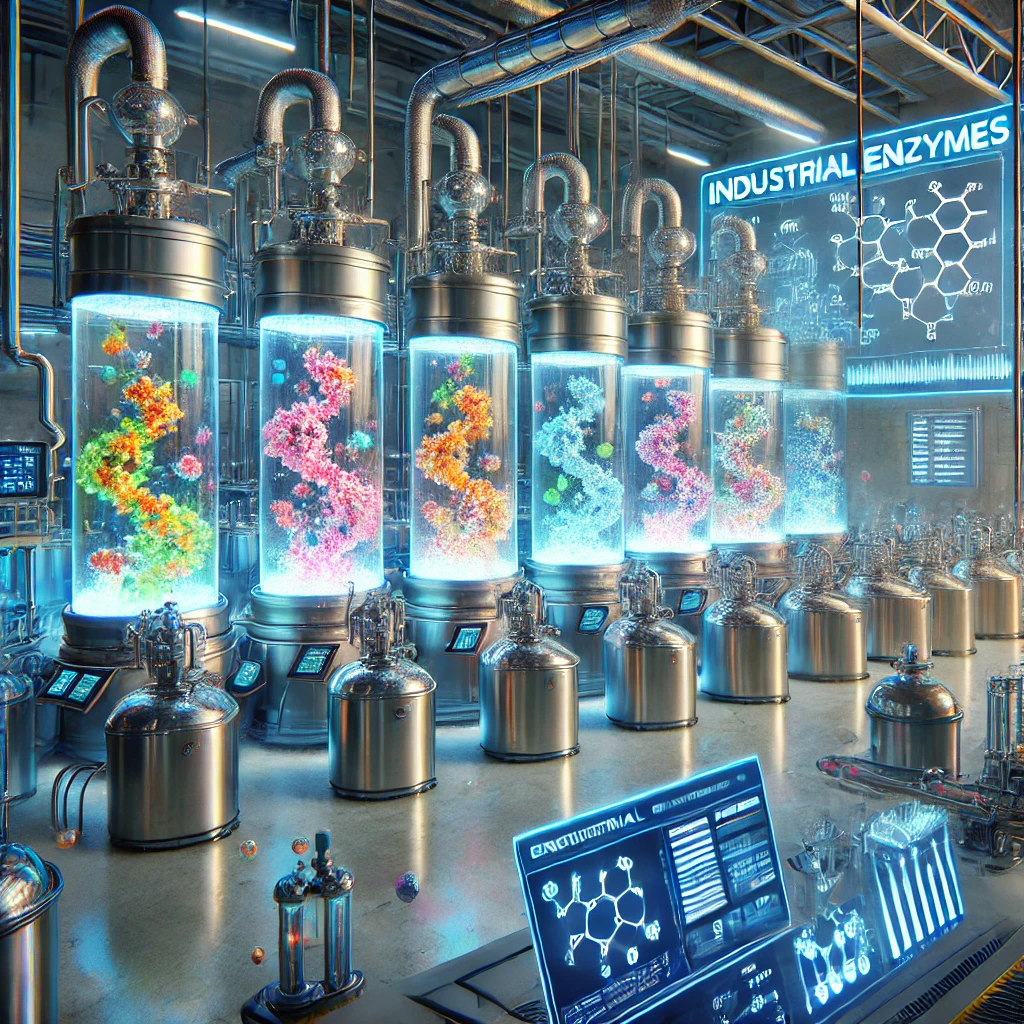The global industrial enzymes market is projected to expand from USD 8.42 billion in 2025 to USD 12.01 billion by 2030, at a CAGR of 7.3% during the forecast period. This growth is primarily driven by increasing demand across various manufacturing sectors, including food and beverages, biofuels, and textiles. Enzymes are emerging as sustainable alternatives to conventional chemical processes due to their eco-friendly nature and efficiency.
Advancements in biotechnology and protein engineering have significantly expanded enzyme applications and improved their effectiveness. Additionally, supportive government regulations and stringent environmental laws—such as the U.S. Toxic Substances Control Act and the Canadian Environmental Protection Act—are promoting the adoption of enzyme-based technologies. The rising global demand for clean-label and organic food products further accelerates the market, as enzymes align with natural and sustainable ingredient requirements.
Download PDF Brochure: https://www.marketsandmarkets.com/pdfdownloadNew.asp?id=237327836
Proteases Segment to Command a Significant Share in the Industrial Enzymes Market
The proteases segment is expected to capture a substantial share of the industrial enzymes market during the forecast period. Proteases have emerged as the fastest-growing enzyme category, driven by their broad applicability, scalability, and increasing demand across multiple industries. These enzymes catalyze the breakdown of proteins into peptides and amino acids, making them highly effective in various applications, including detergents, food processing, leather, and animal feed.
In the detergent industry, proteases are valued for their ability to remove protein-based stains—such as blood, food, and sweat—at low wash temperatures. This contributes to the development of energy-efficient, eco-friendly laundry formulations. In animal feed, proteases enhance nutrient digestibility and help reduce nitrogen excretion, supporting more sustainable livestock production. In food processing, they are widely used for meat tenderization and to improve the texture and digestibility of protein-rich ingredients.
A notable advancement occurred in January 2024, when Novonesis (formerly Novozymes) launched a next-generation protease enzyme for laundry detergents. Designed to perform in cold water and short wash cycles, this innovation supports the growing demand for low-impact, sustainable cleaning solutions and highlights how proteases are driving both performance and environmental goals.
Textile and Leather Industries: Key Markets for Industrial Enzymes
Industrial enzymes are increasingly vital in the textile and leather sectors, offering cleaner, more efficient, and sustainable alternatives to traditional chemical-intensive processes. In textiles, enzymes such as cellulases and amylases are used for bio-scouring—an environmentally friendly technique that removes natural impurities from cotton. According to USDA ARS (Luthra et al., 2019), this method reduces water usage and eliminates the need for harsh alkalis, thereby lowering environmental impact.
In leather processing, enzymes such as proteases, lipases, and laccases are applied in various stages, including pickling, tanning, and degreasing. These biological agents help replace or reduce conventional chemical inputs. A study by the U.S. EPA found that enzymatic tanning using transglutaminase and laccase/tyrosinase effectively processes goat hides into leather while significantly reducing toxic effluent discharge.
Continued research in enzyme immobilization has improved enzyme stability and reusability, further enabling their adoption in industrial applications. As a result, enzymes offer a strategic pathway for the textile and leather industries to meet growing sustainability standards and regulatory requirements while enhancing product quality and operational efficiency.
Request Sample Pages: https://www.marketsandmarkets.com/requestsampleNew.asp?id=237327836
Regional Insights: Asia Pacific Leads in Growth
The Asia Pacific region is expected to register the highest CAGR in the industrial enzymes market during the forecast period. The region’s rapidly growing food and beverage industry is adopting enzymes to improve product quality and shelf life. Government initiatives promoting biofuels have also boosted enzyme usage in bioethanol production.
Additionally, the textile industry’s expansion and its shift towards environmentally friendly processes are driving enzyme demand. Agricultural advancements focused on sustainable farming further support the adoption of enzyme technologies in the region.
Leading Industrial Enzymes Manufacturers:
The report profiles key players such as BASF SE (Germany), International Flavors & Fragrances Inc. (US), DSM-Firmenich (Switzerland), Kerry Group plc. (Ireland), Dyadic International Inc. (US), Advanced Enzyme Technologies (India), Aumgene Biosciences (India), Amano Enzyme Inc. (Japan), Associated British Foods plc. (England), Novozymes A/S (Denmark), F. Hoffmann-La Roche Ltd. (Switzerland), Codexis, Inc. (US), Sanofi (France), Merck KGaA (Germany), and Adisseo (China).
International Flavors & Fragrances Inc. (US)
International Flavors & Fragrances Inc. (IFF) is a leading force in the global industrial enzymes market, particularly following its 2021 merger with DuPont’s Nutrition & Biosciences unit. This strategic integration significantly broadened IFF’s capabilities across food, health, and industrial enzyme applications. Operating through its Health & Biosciences division, IFF delivers cutting-edge enzyme solutions tailored for baking, dairy, brewing, animal nutrition, and sustainable biofuels.
IFF emphasizes clean-label, precision enzyme formulations to align with growing consumer demand for natural and functional ingredients. In 2025, the company introduced a novel enzyme blend aimed at microbiome-supportive foods, enhancing digestive health by increasing prebiotic release from plant-based sources. This innovation reflects IFF’s strategic focus on gut health and functional nutrition, in line with global wellness trends. Backed by a robust biotechnology platform, strong fermentation expertise, and worldwide presence, IFF continues to drive innovation and shape the future of industrial enzymes across developed and emerging markets.
Associated British Foods plc (UK)
Associated British Foods plc (ABF), through its subsidiary AB Enzymes, holds a strategic position in the global industrial enzymes landscape. The company specializes in enzyme solutions for food processing, animal feed, and textile industries. AB Enzymes is particularly known for its customized enzyme technologies that improve baking performance, grain processing, and plant-based food quality.
Renowned for its commitment to clean-label and non-GMO formulations, AB Enzymes caters to regulatory and consumer demands across key markets in Europe, North America, and Asia. In late 2023, the company introduced VERON® GMS+, a next-generation baking enzyme formulated to replace traditional emulsifiers like monoglycerides. This solution supports clean-label goals while maintaining dough integrity and texture. ABF’s integrated supply chain, global distribution reach, and emphasis on sustainability reinforce its position as a dependable supplier of high-performance enzyme solutions. Continued investment in R&D and eco-friendly technologies further strengthens its role in the growing specialty enzyme segment.
Make an Inquiry: https://www.marketsandmarkets.com/Enquiry_Before_BuyingNew.asp?id=237327836

